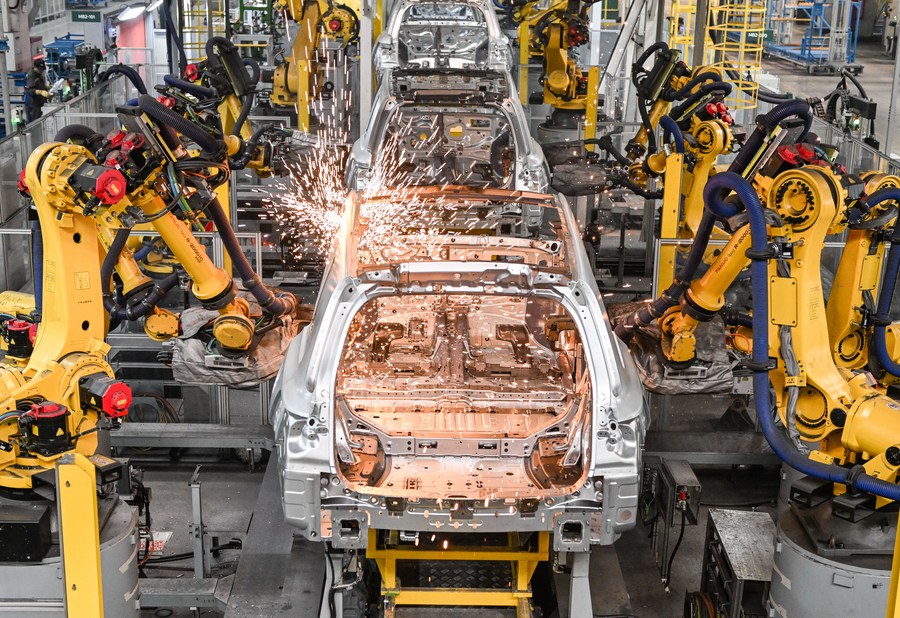British market open to Chinese EV brands, says motor industry leader

Robots weld bodyshells of cars at a workshop of Chinese electric vehicle (EV) maker Li Auto Inc. in Changzhou, east China's Jiangsu Province, Jan. 10, 2024. (Xinhua/Ji Chunpeng)
China is one of the world's biggest motor markets, as well as manufacturers and exporters of cars, a British motor industry leader said.
LONDON, Feb. 21 (Xinhua) -- An increasing number of Chinese automobile brands, especially electric vehicles (EV) brands, are entering the United Kingdom (UK) and British consumers are open to that, a British motor industry leader has told Xinhua.
As long as trade is free and fair, the incoming Chinese brands are good for both UK consumers and the industry, said Mike Hawes, chief executive of the Society of Motor Manufacturers and Traders (SMMT). The entry of these brands to the UK market stimulates competition, which in turn promotes innovation, he explained.
The UK market has always been very open and competitive, Hawes told Xinhua. "It's why a lot of new brands are coming to the UK now," he said.
China is one of the world's biggest motor markets, as well as manufacturers and exporters of cars, Hawes emphasized. The country has been moving rapidly towards EV production and sales and has the economies of scale that will help it compete internationally.

Visitors learn about new energy vehicles of Chinese carmaker BYD during the 27th Guangdong-Hong Kong-Macao Greater Bay Area International Auto Show at the Shenzhen Convention and Exhibition Center in Shenzhen, south China's Guangdong Province, June 16, 2023. (Xinhua/Liang Xu)
Data from the China Association of Automobile Manufacturers shows that exports of China's new energy vehicles (NEVs), including both pure electric and hybrid vehicles, soared by 77.6 percent to more than 1.2 million units in 2023.
UK-China collaboration in the automotive industry is a way of sharing investment costs to respond to the global industry's greatest challenges, such as electrification and autonomous vehicles, Hawes said.
Collaboration also helps identify solutions and innovations from other parts of the world. "In the UK, we have a very close relationship between the industry and academia, and so many Chinese brands have already set up their research and development centers in the UK," Hawes added.
While admitting that due to political and economic uncertainties, the UK has been a difficult place to invest in the last five to six years, Hawes underlined that the UK motor industry saw tremendous investment last year.

Visitors try a simulator of an intelligent sensing system at the exhibition area of Chinese carmaker BYD during the 20th Shanghai International Automobile Industry Exhibition in Shanghai, east China, April 24, 2023. (Xinhua/Fang Zhe)
According to the SMMT, 23.7 billion British pounds (about 29 billion U.S. dollars) of investment, more than those in the seven previous years combined, was poured into the industry in 2023.
Hawes said this "massive vote of confidence" has set up the country to move from internal combustion engines to EVs.
However, the comparatively high prices of EVs have discouraged private consumers in the UK, he said. The SMMT is working with the government to try and get tax breaks for private consumers.
Hawes also called for more public charging points to be built across the country, including on the streets, in car parks and in shopping centers.
According to the government, as of Jan. 1 this year, there were 53,677 public EV charging points in the UK.
- China's new energy products offer diverse choices for consumers
- Interview: Trade protection measures against Chinese EVs would be a "serious mistake," says German economist
- GLOBALink | Indonesian ambassador to China hopes to strengthen cooperation in EV, green economy
- China's BYD adds new dealership in Tokyo
- China-Britain cooperation highlighted at business forum

